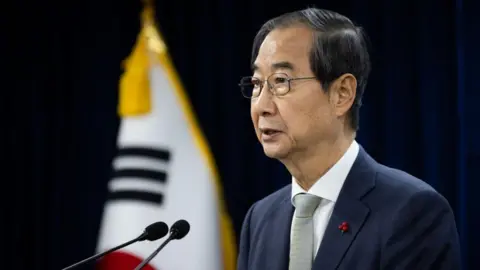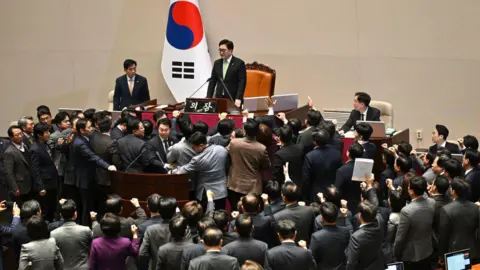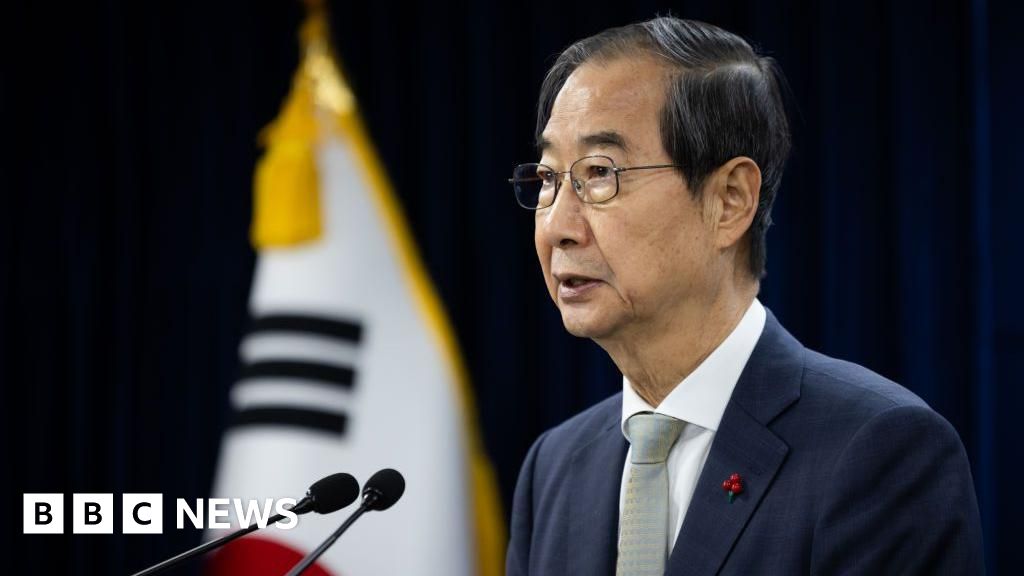 Getty Images
Getty ImagesSouth Korea voted to impeach acting president Han Deok-soo, two weeks after Congress voted to impeach President Yoon Seok-yeol.
A total of 192 members voted in favor of impeachment, exceeding the 151 votes needed for impeachment.
Prime Minister Han took over the role after President Yun was impeached by Congress after his unsuccessful attempt to impose martial law on December 3.
Mr. Han was supposed to lead the country out of political turmoil, but opposition lawmakers claimed that Mr. Han was refusing demands for Mr. Yoon to complete impeachment proceedings.
Dramatic scene in parliament
Congress was thrown into chaos as the vote took place on Friday.
Lawmakers from Yoon and Han’s ruling People’s Power Party (PPP) protested after National Assembly Speaker Woo Won-sik announced that only 151 votes were needed to pass the impeachment bill. did.
This meant that unlike the 200 votes needed to impeach Mr. Yoon, no votes from ruling party members were needed to impeach Mr. Han in the National Assembly this time.
Members of the ruling party gathered in the center of the voting booth and shouted, “It’s invalid!” “Abuse of power!” In response, he called for the chairman’s resignation. Most of them boycotted the vote.
 Getty Images
Getty ImagesMr. Han will be suspended from his duties as soon as he is formally notified by Congress.
Opposition parties first filed an impeachment motion against Han on Thursday after he blocked the appointment of three judges chosen by parliament to handle Yun’s case.
The Korean Constitutional Court normally consists of nine members. At least six judges must support Yoon’s impeachment for the ruling to be upheld.
Currently, there are only six jurors, so if the case is rejected once, Yoon will be spared from dismissal.
Opposition parties had hoped that the three additional candidates would increase the chances of Yoon’s impeachment.
This is the first time that an acting president has been impeached since South Korea became a democracy.
Minister of Finance Choi Sang-mok is scheduled to take over as acting president to replace Han.
Like Yun, Han’s impeachment must be approved by the Constitutional Court, which has 180 days to decide whether to uphold the impeachment.
“We respect the National Assembly’s decision,” Han said Friday, adding: “We will wait for the Constitutional Court’s decision.”
He also said he would suspend his duties “to avoid any confusion.”
On December 3, Yun shocked the nation by declaring martial law, citing the need to protect the country from “anti-national” forces.
Hours later, the president overturned the order after 190 lawmakers voted against it, many of them climbing fences or breaking barricades to enter voting rooms.
Yun later apologized, but said he was trying to protect the country’s democracy.
Since then, Yun and his allies have continued to grapple with the political and legal fallout from the brief period of martial law.
Senior members of Yun’s administration have been arrested and charged with sedition, and Yun is facing an impeachment trial. However, the suspended president is prohibited from leaving the country and has not responded to summons from investigative authorities.
On Friday, South Korea’s won fell to its lowest level against the dollar since the global financial crisis 16 years ago, with both parties blaming each other for the turmoil.
Han’s removal is likely to exacerbate the country’s current political deadlock and uncertainty.




